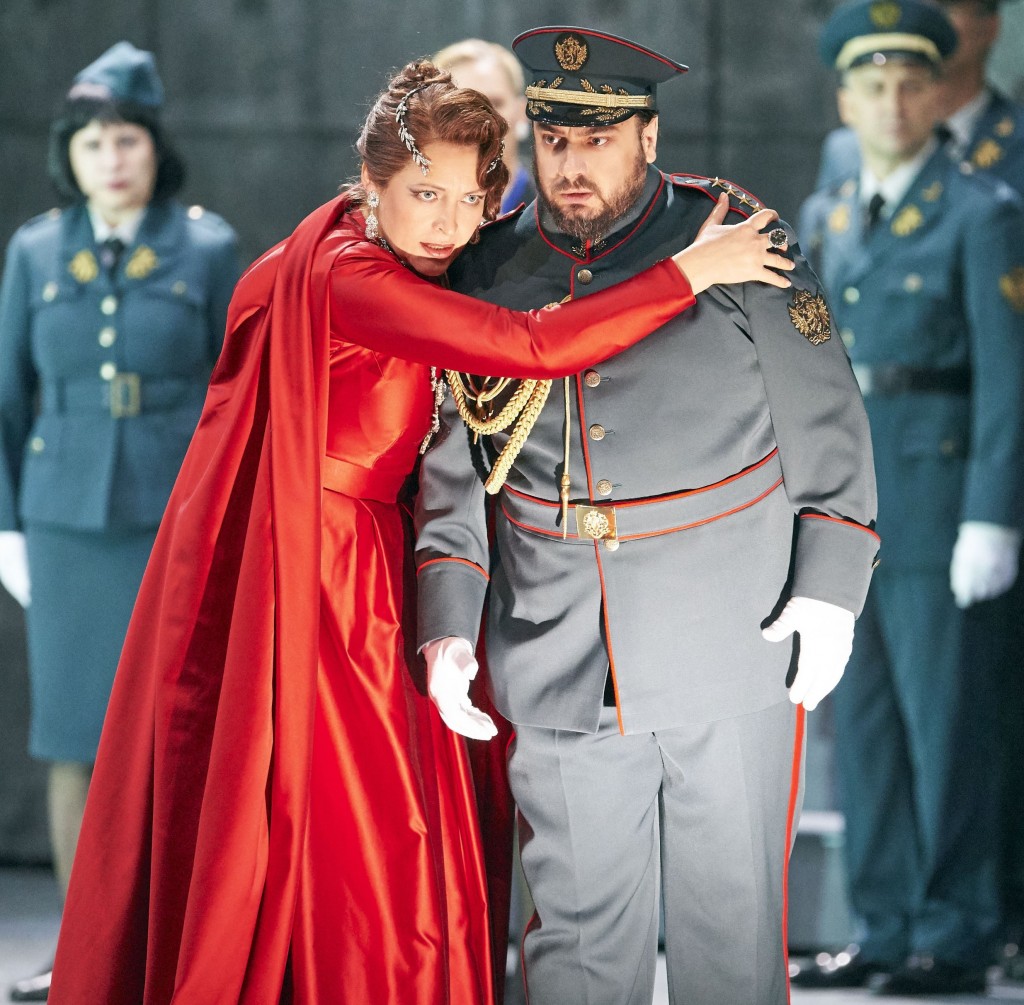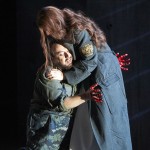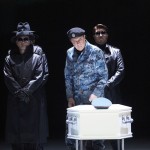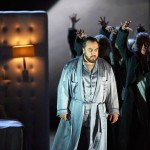 Verdi, like other great 19th Century composers, was inspired by Shakespeare’s plays. Verdi’s Macbeth faithfully follows Shakespeare’s . The focus is on the central characters. The ‘tragedy of Macbeth’ is the fall from grace of the once noble man, who sacrifices all- soul and self-respect- for power. He is egged-on by an over-ambitious wife to gory murders (from the visiting king to his henchman Banquo.) The genius of Shakespeare and Verdi is in showing they pay too high a price: the psychological cost of guilt is despair and madness. Shakespeare’s embittered, world-weary soliloquies – Macbeth’s ‘Out, out brief candle’, and Lady Macbeth’s sleepwalking scene- are transposed by Verdi (and librettist Francesco Piave) into powerful musical arias that broke the operatic mould.
Verdi, like other great 19th Century composers, was inspired by Shakespeare’s plays. Verdi’s Macbeth faithfully follows Shakespeare’s . The focus is on the central characters. The ‘tragedy of Macbeth’ is the fall from grace of the once noble man, who sacrifices all- soul and self-respect- for power. He is egged-on by an over-ambitious wife to gory murders (from the visiting king to his henchman Banquo.) The genius of Shakespeare and Verdi is in showing they pay too high a price: the psychological cost of guilt is despair and madness. Shakespeare’s embittered, world-weary soliloquies – Macbeth’s ‘Out, out brief candle’, and Lady Macbeth’s sleepwalking scene- are transposed by Verdi (and librettist Francesco Piave) into powerful musical arias that broke the operatic mould.
Swirling clouds, smoke billowing as if from a volcano: the backdrop to Verdi’s overture. A whole coven of witches line each side of Vienna’s stage, beneath granite-like walls: divided by a chasm. Verdi’s music is surprisingly spritely -even cheerful. (Vienna State Opera Orchestra excel under Alain Altinoglu.) Never have I seen such a wild and beautiful day, sings Macbeth, (George Petean). He and Banquo (Ferruccio Furlanetto), in (designer) blue camouflage, are like modern-day soldiers.
Mysterious words, comments Macbeth: the witches predict his fortune from general to King; and Banquo ‘not a king , but father of kings’. But black-suited messengers now hail him, as prophesied, Thane of Cawdor. ‘The witches speak the truth,’ sings Petean’s richly complex baritone. Yet why does his hair stand on end. ‘But often the spirits of hell will tell us things to deceive us’, cautions Banquo, Furlanetto’s great Verdi bass celebrating thirty years on the Vienna stage.
The messengers all-in-black, sharply-cut suits and hats, seem out of a film-noir. At first , the outfits seem like a mishmash in Vienna State Opera’s new production of Macbeth. Director Christian Räth has transposed the opera to late 20th century : a modern twist, suggesting some Latin dictatorship. The sets (Gary McCann) for Macbeth’s castle are gloomy concrete minimalism, central staircase discretely lit neon . It works, unless you were expecting tartan kilts. Shakespeare’s (1605) play was located somewhere in the Scottish past: Verdi’s opera (1847, revised 1865) three centuries later. So there is no ‘authentic’ set.
In the letter scene(2) ,the first of Lady Macbeth’s great arias, we see Tatiana Serjan, wearing a figure-hugging silver-grey satin costume. She at first reads the letter (in broken Italian) of how Macbeth met the witches on the day of victory. Then the voice, Serjan’s voluptuous soprano, soars: ‘You are a man of ambition, Macbeth, you strive for greatness.’ She’s singing her innermost thoughts, fired by the prophesy: ‘the witches have procured you Scotland’s throne’. Serjan, a petite brunette, with short modish hair gestures like a mini-potentate. Wonderfully expressive, her coloratura is effortless, but natural: no self-conscious diva mannerisms.
She orders Macbeth, Duncan, coming tonight, must be treated with full kingly honours. But secretly she beckons the foul spirits of night. Vieni! t’affretta! Let the night wrap us in her darkness, hiding the dagger and the heart it pierces. Serjan’s Lady is a feisty modern bitch!
Petean’s Macbeth enters in his greatcoat. Their scene, Verdi’s duet, is the crux of the piece. ‘Don’t you understand!’- ‘And what if I fail in my attempt?’ -‘Come with me now and give him a warm welcome.’ She, the mastermind, has to lead him step by step. This Macbeth, Petean, looks distinguished, a decent man, but he has no imagination: the good guy has to be corrupted.
In his aria- Verdi’s music is ominous- Macbeth is already fearful. Mi si affaccia un pugnal ‘Is this a dagger I see..Your blade draws a trail of blood.’- ‘What was that call?’ We see Tatiana Serjan huddled up, anxious. Verdi makes her plausibly human, no ogre. She has to steel herself for the deed.
Petean’s lyrical baritone (emphasising vulnerability) sings of the voice he’s heard: ‘he shall have nothing but thorns for his pillow’. Serjan’s Lady taunts his whingeing: You are ambitious, but lack courage. He trembles, lashes out, raves. Where is the bold victor of yore? 
(After the deed) she has to order him to take the daggers back, and smears them with (Duncan’s) blood. He slobbers, frightened by every word. ‘If only I could banish the crime from my mind.’- ‘Pull yourself together’, she constantly extorts him.
The morning after, Furlanetto’s Banquo, now in a dashing blue uniform, sings of that terrible night, the voices he heard, the bird of ill omen. Macbeth’s modern servants sing repeatedly, ‘Only with thy light are we able to penetrate the veil of darkness.’ Wonderful singing from Vienna State Opera Chorus, Verdi in Verdi. (Macbeth, black-suited, Lady Macbeth in red, deflect the blame onto Malcolm (Duncan’s son,) who escapes to England.)
Verdi’s Act 2 opens to a bedroom scene, the Macbeth’s. ‘There’s more blood to shed!’ Shall Banquo’s children, as prophesied, ascend the throne? Lady Macbeth, straddled over him, is stroking his hair. ‘You won’t change your mind.’ It must be so. Her sexual charms are a potent instrument of persuasion. But in her aria, she exults, invoking rapturous night : ‘Oh, the ecstasy of power. You satisfy every desire.’
 The chorus of Verdi’s assassins are Mafiosi- sleek-suited, gabardine raincoats, shades – dark figures against the grimly modernist concrete building. Banquo, full of premonitions, sings, on a night like this , his dear King Duncan was killed. Furlanetto’s magnificent bass, subtly modulated over its wide range, is silenced too soon. The stage is invaded by Macbeth’s mobsters who liquidate their prey.
The chorus of Verdi’s assassins are Mafiosi- sleek-suited, gabardine raincoats, shades – dark figures against the grimly modernist concrete building. Banquo, full of premonitions, sings, on a night like this , his dear King Duncan was killed. Furlanetto’s magnificent bass, subtly modulated over its wide range, is silenced too soon. The stage is invaded by Macbeth’s mobsters who liquidate their prey.
In the so-called Banquet scene, Serjan , centre stage in scarlet silk gown, raises her glass to the Macbeth’s success; Banish all sorrow, let joy abound. The celebrations are interrupted by Macbeth, remonstrating with Banquo’s ghost (invisible to the party). Is he mad? Be seated, my lord, consider your guests…(But this is a stand-up do, with drinks passed around.) So is it all in his mind ? Christian Rath’s is a modern take. The stage is cast in shadows, as Macbeth drives the spirit away. I am a man again, he boasts. (You should be ashamed, my lord, she remonstrates.) But Petean sings, front-of-stage, the phantom is after his blood, and will have it.
Superstition plays a key role in Macbeth , but Shakespeare and Verdi are as concerned with the psychological workings of their characters. Verdi’s 19th century was fascinated with the gothic and supernatural; whereas a modern audience might read in ‘subconscious’ motivation.
So opening Act 3 (in Räth’s plausibly modern reading), Macbeth lies in bed; around him, witches move, casting their spells. Is it a dream? What are you doing here, you secretive witches. But he still wants to know his fate.  Effectively staged, we see the spectre of the crowned King looming over a small boy chalking a sketch of the branches of a tree. This becomes a symbol of the budding revolt against Macbeth: finally, the branches (Birnam Wood) camouflage Malcolm’s soldiers marching on Macbeth’s castle.
Effectively staged, we see the spectre of the crowned King looming over a small boy chalking a sketch of the branches of a tree. This becomes a symbol of the budding revolt against Macbeth: finally, the branches (Birnam Wood) camouflage Malcolm’s soldiers marching on Macbeth’s castle.
Macbeth, in Verdi’s aria, imagines the sons of Macduff, wearing his crown, occupying the throne: And you are not even alive, you horrors! Petean appears to faint. The witches warn Macbeth beware of Macduff (‘not by woman born’). Black-hooded figures chalk up the branch symbol backstage . Chorus sing of their downtrodden fatherland. They are led by Macduff, magnificently sung by tenor Jorge de León, a highlight aria bewailing his children murdered by tyrants: In vain they cried out to him, where he’d fled. ‘Our Fatherland betrayed, may Gd’s wrath destroy the villain’. A line of exiles -Macduff, Malcolm- stand together, invoking their oppressed country, Ah, la paterna mano , in what could be a Risorgimento anthem.
Lady Macbeth’s sleepwalking scene is preceded by mournful clarinet and oboe. Una maccia è qui tuttoria, her obsession with cleaning the blood from her hands- not all the perfumes of Arabia can sweeten them- is nothing less than Freudian. Who would have thought the old man would have so much blood? Serjan’s Lady Macbeth is outstanding . Harrowing, low-key -this cannot be the diva – she is stripped back to the vulnerable, pitiful, pathos-ridden woman.
Macbeth, in his battle-cry against traitors, stands defiant. Yet, in his aria, he feels the life in his veins draining away from him. Petean sings sotto voce of Pietta, rispetta, amore , he waits in vain for compassion, respect; but, repeatedly, ‘miserable wretch, curses alone shall be your funeral dirge.’ Plaintively, beautifully sung.
A truly glorious brass section (a trumpet voluntary) announcing Vittoria, radiant the hero (Macduff) who kills the traitor. Glorious Verdi choruses! Never mind Shakespeare’s speeches- Malcolm’s appeal to his countrymen for reconciliation- Verdi’s music says it all. It’s all over in a chorus. © P.R. 21.10.2015
Photos: Tatiana Serjan (Lady Macbeth) and George Petean (Macbeth); George Petean and Tatiana Serjan; Ferrucio Furlanetto (Banquo) and Jongmin Park (Spy); George Petean (Macbeth)
© Wiener Staatsoper/ Michael Pöhn
viennaoperareview.com
Vienna's English opera blog

Top site ,.. amazaing post ! Just keep the work on !